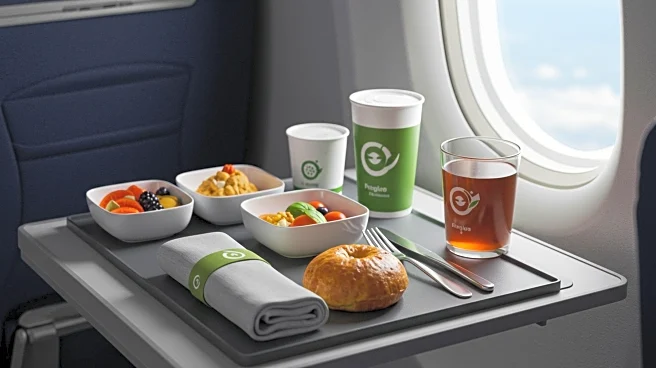What's Happening?
United Airlines has implemented new eco-friendly meal service items in its economy cabins as part of its sustainability efforts. The initiative, launched in 2024, aims to reduce the use of single-use plastics on flights. The airline has introduced 100% bamboo cutlery, napkins made from 70% recycled materials, and other non-plastic packaging materials. This move is part of a broader trend within the airline industry to minimize waste and carbon footprints. Airlines are increasingly adopting sustainable practices, such as fuel-efficient routes and electric ground vehicles, to balance customer needs with environmental responsibility.
Why It's Important?
The introduction of eco-friendly meal service items by United Airlines is significant as it reflects the growing emphasis on sustainability within the airline industry. By reducing single-use plastics, airlines can significantly decrease their environmental impact, contributing to global efforts to combat pollution and climate change. This initiative not only aligns with environmental goals but also meets the increasing consumer demand for sustainable travel options. As airlines strive to reach net zero emissions by 2050, such measures are crucial in achieving these targets. The move could set a precedent for other airlines to follow, potentially leading to industry-wide changes in onboard service practices.
What's Next?
As airlines continue to explore sustainable practices, further innovations in onboard services are likely. United Airlines and others may expand their eco-friendly initiatives to include more aspects of flight operations, such as reusable amenity kits and sustainable aviation fuels. The industry may also see increased collaboration with environmental organizations to develop new technologies and strategies for reducing emissions. Passenger feedback and demand for sustainable options will likely influence future developments, encouraging airlines to prioritize eco-friendly solutions in their service offerings.
Beyond the Headlines
The shift towards sustainability in the airline industry may have broader implications beyond environmental impact. It could influence regulatory policies, prompting governments to enforce stricter environmental standards for airlines. Additionally, this trend may affect the supply chain, encouraging manufacturers to produce more sustainable materials and products. The cultural shift towards eco-consciousness in travel could also lead to changes in consumer behavior, with passengers increasingly choosing airlines based on their sustainability credentials.











